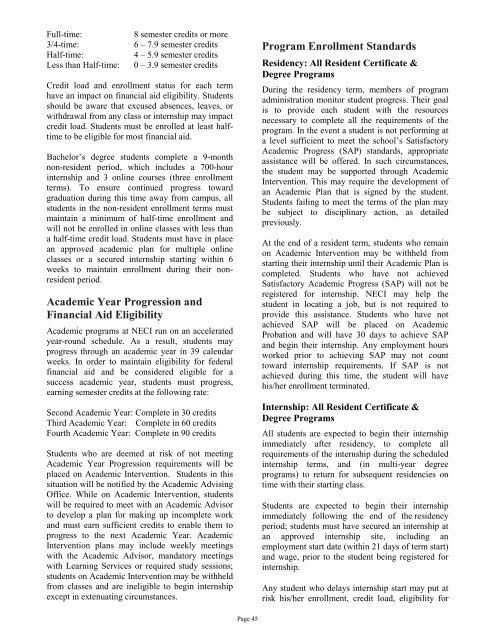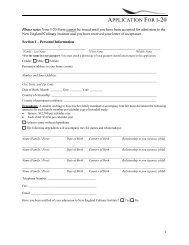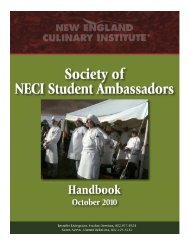Student Handbook - New England Culinary Institute
Student Handbook - New England Culinary Institute
Student Handbook - New England Culinary Institute
You also want an ePaper? Increase the reach of your titles
YUMPU automatically turns print PDFs into web optimized ePapers that Google loves.
Full-time:<br />
3/4-time:<br />
Half-time:<br />
Less than Half-time:<br />
8 semester credits or more<br />
6 – 7.9 semester credits<br />
4 – 5.9 semester credits<br />
0 – 3.9 semester credits<br />
Credit load and enrollment status for each term<br />
have an impact on financial aid eligibility. <strong>Student</strong>s<br />
should be aware that excused absences, leaves, or<br />
withdrawal from any class or internship may impact<br />
credit load. <strong>Student</strong>s must be enrolled at least halftime<br />
to be eligible for most financial aid.<br />
Bachelor’s degree students complete a 9-month<br />
non-resident period, which includes a 700-hour<br />
internship and 3 online courses (three enrollment<br />
terms). To ensure continued progress toward<br />
graduation during this time away from campus, all<br />
students in the non-resident enrollment terms must<br />
maintain a minimum of half-time enrollment and<br />
will not be enrolled in online classes with less than<br />
a half-time credit load. <strong>Student</strong>s must have in place<br />
an approved academic plan for multiple online<br />
classes or a secured internship starting within 6<br />
weeks to maintain enrollment during their nonresident<br />
period.<br />
Academic Year Progression and<br />
Financial Aid Eligibility<br />
Academic programs at NECI run on an accelerated<br />
year-round schedule. As a result, students may<br />
progress through an academic year in 39 calendar<br />
weeks. In order to maintain eligibility for federal<br />
financial aid and be considered eligible for a<br />
success academic year, students must progress,<br />
earning semester credits at the following rate:<br />
Second Academic Year: Complete in 30 credits<br />
Third Academic Year: Complete in 60 credits<br />
Fourth Academic Year: Complete in 90 credits<br />
<strong>Student</strong>s who are deemed at risk of not meeting<br />
Academic Year Progression requirements will be<br />
placed on Academic Intervention. <strong>Student</strong>s in this<br />
situation will be notified by the Academic Advising<br />
Office. While on Academic Intervention, students<br />
will be required to meet with an Academic Advisor<br />
to develop a plan for making up incomplete work<br />
and must earn sufficient credits to enable them to<br />
progress to the next Academic Year. Academic<br />
Intervention plans may include weekly meetings<br />
with the Academic Advisor, mandatory meetings<br />
with Learning Services or required study sessions;<br />
students on Academic Intervention may be withheld<br />
from classes and are ineligible to begin internship<br />
except in extenuating circumstances.<br />
Program Enrollment Standards<br />
Residency: All Resident Certificate &<br />
Degree Programs<br />
During the residency term, members of program<br />
administration monitor student progress. Their goal<br />
is to provide each student with the resources<br />
necessary to complete all the requirements of the<br />
program. In the event a student is not performing at<br />
a level sufficient to meet the school’s Satisfactory<br />
Academic Progress (SAP) standards, appropriate<br />
assistance will be offered. In such circumstances,<br />
the student may be supported through Academic<br />
Intervention. This may require the development of<br />
an Academic Plan that is signed by the student.<br />
<strong>Student</strong>s failing to meet the terms of the plan may<br />
be subject to disciplinary action, as detailed<br />
previously.<br />
At the end of a resident term, students who remain<br />
on Academic Intervention may be withheld from<br />
starting their internship until their Academic Plan is<br />
completed. <strong>Student</strong>s who have not achieved<br />
Satisfactory Academic Progress (SAP) will not be<br />
registered for internship. NECI may help the<br />
student in locating a job, but is not required to<br />
provide this assistance. <strong>Student</strong>s who have not<br />
achieved SAP will be placed on Academic<br />
Probation and will have 30 days to achieve SAP<br />
and begin their internship. Any employment hours<br />
worked prior to achieving SAP may not count<br />
toward internship requirements. If SAP is not<br />
achieved during this time, the student will have<br />
his/her enrollment terminated.<br />
Internship: All Resident Certificate &<br />
Degree Programs<br />
All students are expected to begin their internship<br />
immediately after residency, to complete all<br />
requirements of the internship during the scheduled<br />
internship terms, and (in multi-year degree<br />
programs) to return for subsequent residencies on<br />
time with their starting class.<br />
<strong>Student</strong>s are expected to begin their internship<br />
immediately following the end of the residency<br />
period; students must have secured an internship at<br />
an approved internship site, including an<br />
employment start date (within 21 days of term start)<br />
and wage, prior to the student being registered for<br />
internship.<br />
Any student who delays internship start may put at<br />
risk his/her enrollment, credit load, eligibility for<br />
Page 45






